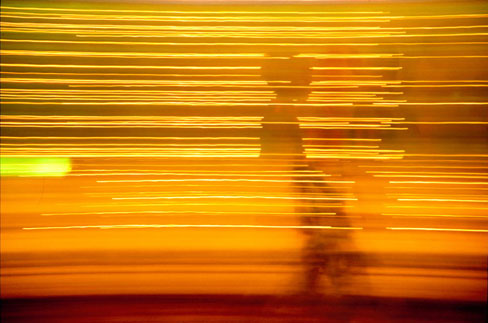Is Joslin insufficiently aware of his religious biases? Maybe, but I'm hard-pressed to find good evidence for that in the book. Joslin provides dozens of intentions for each stage of a run, including treating stretching positions as prayer postures, dividing the run into segments devoted to focusing on breathing, concentrating on the feet, and practicing lovingkindness (what he calls the "Mother Teresa" run). Many of Joslin's practices are variants on zikr,
 the Sufi practice of reciting the shehadeh, the Muslim equivalent of the
Shema. He chants "Onward to the One" or recites the Trisagion. He recites
"Lord have (inhale), Mercy (exhale), Christ have (inhale), Mercy (exhale)." If
anything, this is dressing an essentially Muslim practice in Christian garb -
not the reverse. As it happens, in my running practice, even before reading
the book, I did a similar practice, reciting the Shema, or other phrases,
in zikr mode -- something I learned from one of my teachers. It fits naturally with the rhythm of the run and with the mind simultaneously in motion and at rest.
the Sufi practice of reciting the shehadeh, the Muslim equivalent of the
Shema. He chants "Onward to the One" or recites the Trisagion. He recites
"Lord have (inhale), Mercy (exhale), Christ have (inhale), Mercy (exhale)." If
anything, this is dressing an essentially Muslim practice in Christian garb -
not the reverse. As it happens, in my running practice, even before reading
the book, I did a similar practice, reciting the Shema, or other phrases,
in zikr mode -- something I learned from one of my teachers. It fits naturally with the rhythm of the run and with the mind simultaneously in motion and at rest.
Dan: The Sufis have a tradition that the name of Allah can be found in all things - that the cry of the pheasant and the bray of the donkey are both praises of Allah, that the arrangement of the seeds in an aubergine are likewise always a paeon to the Infinite Unity of Allah. These arrangements that connect to the Divine require interpretation but not re-arrangement or preparation in the way that Joslin suggests for running. With him, the chant, rather than the running, becomes pre-eminent.
That is my third problem with the book: it acts as though there is nothing distinctive about running. Of course, if life is about beholding the wonder of the ineffable Divine Being that exists among and beyond us, then we should, of course, attempt to be part of it during our daily actions at all times and in all ways. However, this reasoning doesn't distinguish between running and taking the garbage down as times for marvelling at the existence that has been brought into Being. What we have to appreciate is running qua running, running for itself. This is the third thing that I find disingenuous about the book: nothing in it shows that he appreciates running for itself. He hedges running in with practices that appropriate it for his own lifestyle, using prayer as an apology for taking time to run. Although he claims to believe in running the account of his actions suggest that Joslin has more faith in multi-tasking than in multi-religions. Despite paying lip-service to inclusion and divinity, his account is particularist when it comes to religion, flattening when it comes to running.
 Jay: And yet, despite all of that, Joslin ultimately arrives at a place similar to one I've noticed : The mind drops out, and even the tools used to get 'here' are set aside - however 'particular' those tools may have been. Eventually, there is only the One. I say to myself: Just run. And then I just run. Without intention, it is known that this is God running. This is God in pain. This is God flowing through veins and arteries. Towards the end of the book, Joslin quotes one of my teachers, Rabbi David Cooper, and continues, "I think of running meditation not as a movement toward God, but as an interaction with God along the way. In effect, the running is God. Or in Rabbi Cooper's terms, running meditation is a way of practicing God-ing." [238]
Jay: And yet, despite all of that, Joslin ultimately arrives at a place similar to one I've noticed : The mind drops out, and even the tools used to get 'here' are set aside - however 'particular' those tools may have been. Eventually, there is only the One. I say to myself: Just run. And then I just run. Without intention, it is known that this is God running. This is God in pain. This is God flowing through veins and arteries. Towards the end of the book, Joslin quotes one of my teachers, Rabbi David Cooper, and continues, "I think of running meditation not as a movement toward God, but as an interaction with God along the way. In effect, the running is God. Or in Rabbi Cooper's terms, running meditation is a way of practicing God-ing." [238]
Dan: I agree with you here Jay, and this is the best part of the book for me. Given that, doesn't this point to a significant problem of the book: that Joslin only chooses testimony that can be squeezed into affirmation of his worldview, and the reader likewise is encouraged only to respond to those parts of the book with which he or she agrees?



"We are Seriously Concerned
About the Fate of
the State of Israel"
An interview with four former Israeli Intelligence Directors
Are the Ten
Commandments
Carved in Stone?
Joel Shurkin
Run Like the Wind
Dan Friedman &
Jay Michaelson
Erev
Temima Fruchter
Fleeing Edges
Noam Mor
Josh Goes to Services
Josh Ring
Archive
Our 400 Back Pages
Saddies
David Stromberg
Zeek in Print
Fall 03 issue now on sale
About Zeek
Events
Contact Us
Links
From previous issues:
Simulacra and Science Fiction Dan Friedman
Dan Friedman
Are we all asleep?
Jay Michaelson
Carrying Light into Dark Times
Rabbi Zalman Schachter-Shalomi
